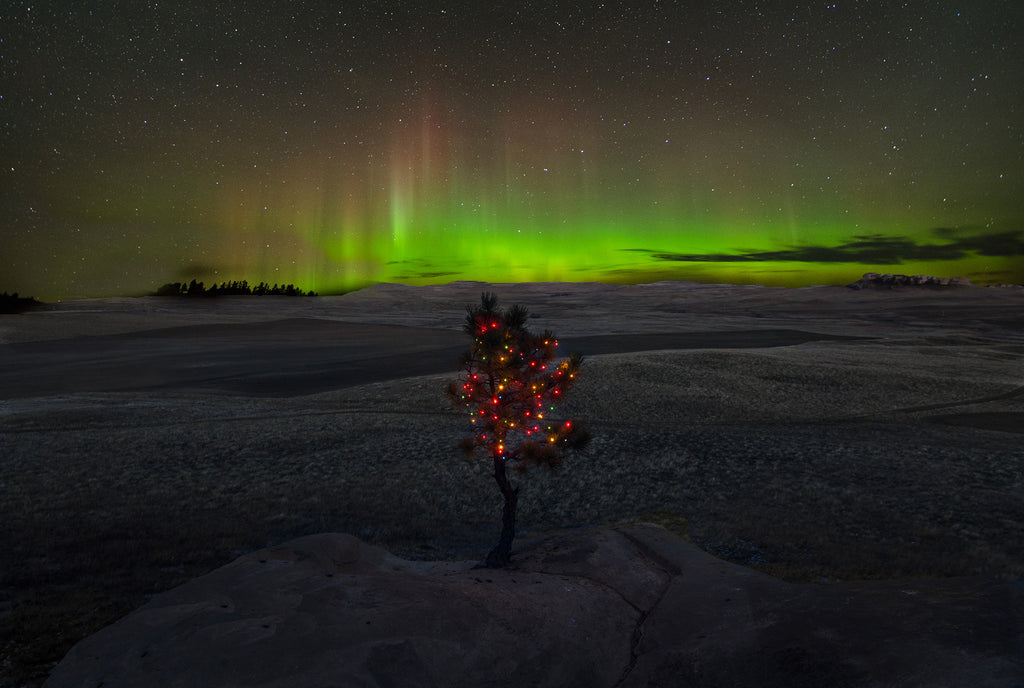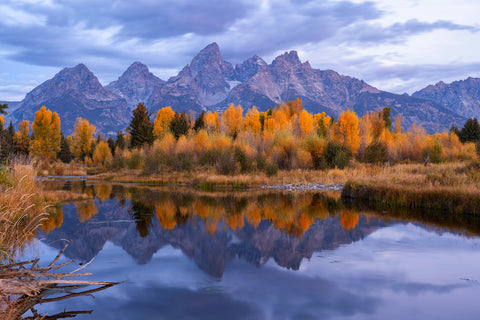Nearly half a century ago, when I was a young boy in Northern Vermont, and Cyber Monday was as far off as any notion I had of the world being larger than the Northeast Kingdom, winter wasn't marked by any equinoctial event or particular day on the calendar. For us, and many other families scratching out a living along the Canadian Border, we heralded winter by cutting a Christmas tree. The Thanksgiving meal had been eaten, deer season, with its reverberating rifle shots and town talk of who had gotten their buck, had ended, and often Nature had covered the landscape in deep snow that would persist well into May. In this quiet time of knit mittens and oversized snow boots, on a day when there wasn't much for a boy in love with the outdoors to do, save dream of a spring he could hardly imagine ever coming, my father would load me, his wooden-handled axe, and a ten-foot piece of clothesline into our station wagon and we'd embark on a journey to find a Christmas tree.
Into the face of a north wind, on the very doorstep of winter, we'd set off on a day when there never seemed to be much light - a heavily-filtered dimness like that inside our neighbor's barn where years of cobwebs cloaked bare bulbs.
The perfect tree had to be a balsam fir. As surely as God was a Red Sox fan or Vermont maple syrup tasted better than any made in New Hampshire, a balsam was the only species fit to be taken indoors and adorned with lights and ornaments. I learned, before I was four years old, to recognize them in two ways. Their needles were flat and would not roll between my fingers if I plucked one, and the tree as a whole was never nearly as a full as the more tight-limbed spruce which, to a four-year-old, always appeared a better choice.
In early acts of independence, I remember leaving the trail my father carved through the snow, trudging off in my own direction where forward progression came with much struggle and sideways rocking - a trick all small children learn in the North Country to knock down otherwise-waist-high snow drifts - to the base of what appeared a postcard-perfect tree. It was a game I played with my dad, knowing there was no way I could trick him into cutting a spruce, and yet not entirely willing to submit to a sparsely-branched balsam without some effort to the contrary. My opinion counted, no doubt, but it counted a hell of a lot more if I voted for a balsam.
Eventually, I would. As the dim day moved toward dark, the clumps of snow hanging off the thick strands of yarn on my mittens grew to golf-ball-size, and a damp cold made its way through snow pants fifteen years the back side of Goretex, I'd agree that the next candidate my father suggested was indeed the world's most perfect tree. He'd shake snow from its limbs, disappearing momentarily behind a white, grainy curtain, and then, with warning to his curious son to remain clear, would swing the axe head low into the trunk. As the pile of white, pitchy wedges of heartwood grew around him, I'd watch the top of the tree expectantly, waiting for the first indication that it and terra firm would soon unite. When the steeple-thin treetop swayed at the stroke of the axe and did not rebound to vertical, my father would request my help pushing the balsam over and with all my strength - and my dad's hands high above my head on the tree where I couldn't see them - I'd shove it down, the last bit of wood shearing with a cold pop as it broke free of the stump.
It seemed like a long way back to the station wagon, tucked against a neighbor's dairy barn in a tractor-plowed driveway. My father would pull the tree behind him with the clothesline while I rode on its branches, the bare limbs of poplars passing overhead like the skeletal fingers of summer, and if there was enough snow in the road we needed to cross when at last we neared the car to prevent needles from rubbing off, I'd remain on the tree all the way.
A day later, after standing long enough under the eves to shed some of the snow it had accumulated on its way to our car, we'd bring the tree inside, decorating it with glass ornaments, some sixty years old, and strings of large, colored lights whose bulbs clinked together with a rich noise all their own as I helped unwind them.
Once lit, it was color, warmth, fragrance, and hope, too, I believe, standing inside our home while winter engulfed the world outside. It was also a damn long time ago.
I thought about it the other day driving from my Montana home to the Dollar Store in Billings, where four bucks got me a dozen of the cheapest size-C batteries to be found. With my wallet another six dollars lighter, I had half a dozen strands of battery powered lights, and a plan for this year's Christmas tree that needed only a clear night and a cooperative north sky.
Three days later, on an afternoon much like the ones I remember spending in the snow with my father, a favorable evening forecast sent me driving 100 miles to edge of Montana's plains where, during a summer walk in search of arrowheads, I'd found my Christmas tree for this year.
No balsam out here, I thought, wheeling onto I-90, so right from the get-go I knew it wasn't going to be a "perfect" tree. Well, judging by their collapse to the Cleveland Indians in the first round of the AL playoffs this year, if God was still a Sox fan he certainly hadn't offered any divine help at the plate. Perhaps things were changing. Perhaps a ponderosa pine would be good enough. Perhaps someone, somewhere, is selling a picture on Ebay of our lord in the clouds above Wrigley Field.
I smiled thinking about it, gunning my truck up to the western speed limit of 80 miles an hour, then remembered another year when traditions fell. I was eleven, armed with a department store hatchet, followed by my nine-year-old sister who I'd begrudgingly agreed could come along and help look for our Christmas tree, provided she carried our lunch box and thermos of hot chocolate.
A hard-packed snowmobile trail took us up through the center of Irasburg, the village where we lived, then wound away from town and angled across overgrown pastures of wild apple trees and meadowsweet toward the distant, naked ridges of Allen Hill.
The day didn't seem as dim or the world quite a small as it had years earlier when I'd ridden back to our car on the trees my father cut, but the stillness of the season and sense of a long, hard haul to spring remained the same.
We poked along until noon, meandering off the trail, circling clumps of thorn apples and red osiers, inspecting with critical eyes eight or ten trees, all of which we found fault with. We ate peanut butter and grape jelly sandwiches, bread oozing a purple dampness, and drank luke warm hot chocolate, sharing a thermos cup, careful to drink from opposite sides.
It was thirty-some years ago, I thought, cruising further away from Montana's mountains, whipping past a landscape of wheat stubble and sage coulees, but I can still remember the sky-blue, satiny mittens my sister wore and how my hands had sweat inside my gloves, making them hard to pull back on after we ate lunch.
An hour into the afternoon, it began to snow. Small, crystalline flakes that either don't amount to much or arrive in advance of a real storm. The sky, without definition, didn't tell which type these were, and we pressed on, our tracks skirting stone piles and a pair of loose, triple-strand fences.
I believe we saw the tree together at the same time. Sprouted on the south side of large fir, it had grown shielded from the north wind. Ten feet tall and nearly as big around, we walked its perimeter twice, unable to find a single thing wrong with it. And then I picked one of its needles, easily rolling it between my thumb and forefinger. Spruce, without a doubt.
I looked at my sister and we both looked at the tree, the top of Irasburg's Protestant Church steeple visible on the horizon behind it. When I was four, my independence led me out of my father's footsteps through drifted snow. At eleven, on a snowy afternoon with my sister standing next to me, it decreed that the reign of balsam fir in the Mosher household was over.
My hatchet, while a prized possession, was far from sharp. It's rubber-coated aluminum handle was crooked from too many impacts against a large cedar tree I'd practiced all summer throwing the blade into. I'd gotten the hang of it eventually, calculating the hatchet's rotation well enough to stick it three out of four times, but it had come at the price of a bent handle. As I clubbed away at the tree's dense, lower limbs, fighting into the trunk, it twisted in my hands, one in three blows landing as it should.
Twenty minutes of hacking revealed a disproportionately large trunk, a beefy eight inches through with bark sporting sap bubbles the size of jelly beans. I swung the hatchet at it with all my might, striking it reasonably close to where I wished, and watched the blade take a quarter-inch bite.
Leaving I-90 for the final 25 miles of my drive last week, I remembered momentarily thinking that even with all the great, Northern Vermont determination everyone in the Northeast Kingdom possess, maple sap could be flowing before that bull of a spruce gave up the ghost. Still, I went at it with a vengeance, chipping away as somewhere behind those steely clouds the sun found its way to the western side of Irasburg Mountain and night fell. Brother and sister walked home together, crossing the village common - that green in the center of town - as the local volunteer fire department flooded it with light from their trucks and water from their hoses, the annual skating rink one night of frigid temperatures away.
The sun was still up and bright where I parked my truck on the edge of a long prairie in Eastern Montana, and it had shined brightly that next day in Vermont, too, a rarity in December, lending confidence to the two kids who once more headed out with hot chocolate, sandwiches, and a hatchet whose head was dark with pitch. Our walk to the spruce wasn't much further than mine to the little ponderosa I'd found, growing at the edge of a sand rock cliff, but it took much longer. As I stepped easily over a Montana barbwire fence, I remembered holding the top strand of one much lower down with all my weight, helping my sister across.
We'd spent the next four hours hacking away on that tree, eating a quick lunch, working in lengthening shadows until, ringed with hatchet scars on all sides, at last it sank slowly to one side, popping free of its stump, the butt now five feet up in the air, held high by thick limbs. Our grand plan of dragging the tree into our yard, where it would be a total surprise to our parents, quickly morphed into somehow getting it a hundred yards to a road our dad could drive on and pick it up with the car. This would be Herculean work enough.
I could probably do it in five minutes now, I thought, leaping out onto a narrow ledge sixty feet above the earth with my camera, lights, and tripod. Still, it was no small feat back then, and we'd reached the road just before sunset, the top of Allen Hill glowing a cold, bright white in the east.
I broke the news to my father that this year we would have a spruce, and I think he was secretly proud to see I'd made a decision entirely on my own, not in keeping with his, though there was talk of the similarity in scent between such a tree and my giant, semi-domesticated tom cat, Lynx. We lashed it to the top of a car no more than one model newer than the one we'd brought trees home in when I'd ridden on them, and the next day my mother filled a large garbage can with chunks of concrete to use as a stand and help steady it in our living room, where it reached to within an inch of the ceiling.
I've always liked decorating them, I thought, stringing out my battery-powered lights, watching a young ponderosa transform into something beautiful, if not oddly out of place. No one is going to see this here tonight I thought, save perhaps a mule deer or owl that comes by in the dark and wonders what these bright lights are all about.
Well, enough people in Irasburg certainly saw our spruce that year. It filled the room and was, among the trees we knew, the crown jewel. It stood while Lynx shredded the top of a boot box we kept our Christmas lights in. It stood while New Year's came and went, snow piled up to the bottom of our downstairs windows, and a January thaw sent it shrinking more than a foot over night. It stood, drinking more than a gallon of water each day, until the longest month of Vermont's winter was behind us. It stood, until with some sadness, we stripped it of its splendor and my father pulled it through our back door and out onto a brush pile where it remained for three years, sheltering mice and lending a summer perch to the brown thrasher who liked its now needleless branches. The day we burned it, when I was a teenager, wild cucumber vines had encircled it like the tinsel my sister and I had draped over it.
As I put the last strand of lights on the ponderosa, I remembered watching the smoke from the brush pile fire curl skyward and drift toward Allen Hill, a landmark not as distant as it had seemed a few years earlier. Lynx was gone then, though his claw marks remained in the box still used for our lights.
Things do hang on to remind us, I thought, setting up my camera as the sky overhead faded from blue to silver and the first stars winked on. I'd come home from college for Christmas one year and, while doing a little work to our back door, found a round needle wedged under the stop. We'd only had one spruce, so there was no doubt to which tree it belonged.
I could walk, even now I thought, from our front door to the exact spot my sister and I had cut that tree down. Maybe there would be a rotten stump covered in small shelf fungus, or maybe that window closed a decade ago and there would be only other younger trees. Either way, I could find it I thought as the night darkened and on the northern horizon the aurora borealis flickered.
I sat taking pictures of this year's Christmas tree until long, long after dark. Let winter come, I thought as I finally unwound the lights. But don't let it come tonight. Let us have a few more late-fall days. A few nights when we don't need a fire in the stove. A little time to remember summer. A little time to remember past Christmases before the holiday season hits full stride this year.
All the tree I'll have to remember this year is the little ponderosa which, for a few hours, wore a coat of lights. But I like that. And while I doubt I'll ever decorate it again, I will check on it from time to time. The crack it's growing from will spread. Its limbs will reach higher and its trunk grow thicker. An owl will land in it, a bobcat walk by it, and perhaps someone will even build a house within sight of it on the prairie.
Everything changes, I thought, stepping over the barbwire fence again on my way back to my truck. Years, and trees, and men. And then, just before I started my engine for the drive home, I laughed. I still can't picture God a Cubs fan.




Brad Hawxhurst
Jake, I knew your Dad. You learned well from him. Your images correspond beautifully with my memories of growing up in Vermont. I’m in Arizona now, but always think back to when Vermont was my home. Maybe we’ll meet there someday.
Jen
Best Christmas tree in Montana!
Phillis
This little tree is the embodiment of hope, strength, and now, love. Thanks!
Dhonna
Ah, that was a pleasant vision. Thank you for sharing your memories! Love the photo, too.
Annie
I remember all this. I would still drink from the other side of the cup, and cut a tree with you every year.